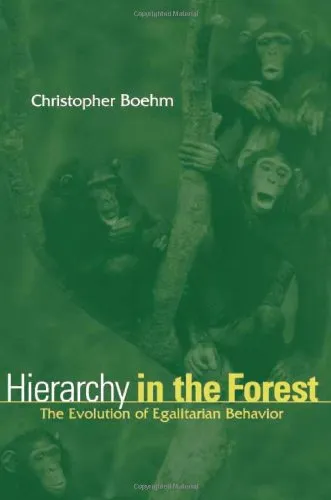Hierarchy in the Forest: The Evolution of Egalitarian Behavior
4.5
بر اساس نظر کاربران

شما میتونید سوالاتتون در باره کتاب رو از هوش مصنوعیش بعد از ورود بپرسید
هر دانلود یا پرسش از هوش مصنوعی 2 امتیاز لازم دارد، برای بدست آوردن امتیاز رایگان، به صفحه ی راهنمای امتیازات سر بزنید و یک سری کار ارزشمند انجام بدینکتاب های مرتبط:
معرفی کتاب 'Hierarchy in the Forest: The Evolution of Egalitarian Behavior'
کتاب 'Hierarchy in the Forest' اثر کریستوفر بوهم به بررسی چگونگی تکامل رفتارهای برابرخواهانه در جوامع انسانی و پیشانسانی میپردازد. این کتاب با ترکیب دادههای باستانشناسی، قومشناسی و رفتارشناسی حیوانات، نگاهی دقیق به چگونگی شکلگیری هنجارهای اجتماعی و نقش آنها در توسعه جوامع انسانی دارد.
خلاصهای از کتاب
بوهم در این کتاب به تحلیل فرآیندهای پیچیدهای میپردازد که توسط آنها جامعههای اولیه انسانی به سیستمهای سیاسی برابرخواهانه دست یافتهاند. او با بررسی گروههای شکارچی-گردآورنده، نشان میدهد که چگونه این جوامع به متابعت از قوانین برابرخواهانه، هنجارهایی پایهگذاری کردهاند که مانع از تسلط افراد بر گروه میشود.
بوهم با استفاده از شواهد علمی و مطالعات میدانی، نظریهای جدید پیشنهاد میکند که چگونه ویژگیهای ژنتیکی و اجتماعی تعامل کرده و منجر به شکلگیری نهادهای برابرطلب در جوامع انسانی شدهاند. او معتقد است که اعمال قوانین اجتماعی مانند انتقامگیری یا تحریم اجتماعی، نقش اساسی در حفظ تعادل قدرت در گروههای اولیه داشتهاند.
نکات کلیدی
- تحلیل رفتارهای برابرخواهانه به عنوان یک استراتژی تطبیقی در جوامع انسانی و نزدیکان نزدیکشان.
- بررسی مکانیزمهای فرهنگی و اجتماعی که به حفظ ثبات و تعادل در برابر قدرتهای متمرکز کمک میکنند.
- تاکید بر نقش دموکراسی ابتدایی در ساختارهای اجتماعی پیشزبان در گروههای انسانی آغازین.
جملات معروف از کتاب
بوهم مینویسد: "در واقع، گروههای انسانی اولیه، دیگر زورمندان را با چنان دقتی کنترل میکردند که بسیاری از بالاپایینهای قدرت نه به عنوان مشکل بلکه به عنوان قسمتی از راهحل جامعه دیده میشدند."
او در جای دیگری میافزاید: "تمدنهای انسانی، آنجا که پایداری اجتماعی آنها متمرکز شده، تنوعی از برابریگرایی را مشاهده میکنند که نه تنها اطلاعات علمی، بلکه حتی عملکرد اخلاقی را ارتقا میدهد."
چرا این کتاب اهمیت دارد
این کتاب برای کسانی که به تکامل فرهنگی، انسانشناسی و فهم چگونگی ساختار اجتماعی جوامع انسانی علاقه دارند، یک منبع بینظیر است. 'Hierarchy in the Forest' نه تنها به تحلیل واقعیتهایی درباره گذشته اجتماعی انسان میپردازد، بلکه چالشی بزرگ برای نظریههای سنتی در باب قدرت و سلسله مراتب ارائه میدهد. توسط در نظر گرفتن شواهد علمی و تجربیات میدانی، کریستوفر بوهم راهی نوین برای فهم جوامع انسانی و رفتارهای اجتماعی پیشنهاد میکند.
Introduction to "Hierarchy in the Forest: The Evolution of Egalitarian Behavior"
In "Hierarchy in the Forest: The Evolution of Egalitarian Behavior," Christopher Boehm embarks on a captivating exploration of human social structures, particularly the origins and development of egalitarian societies. This book deftly blends anthropology, evolutionary biology, and political theory to unpack how humans have navigated between hierarchical and egalitarian modes of living throughout their evolutionary journey. As we delve into the intricacies of human social organization, we gain insights into what it means to cooperate, share, and lead in our complex societies.
Detailed Summary of the Book
Egalitarian societies are a fascinating paradox within the broader context of evolutionary biology, where competition often dictates survival. Boehm's work investigates this paradox by studying both contemporary and ancient hunter-gatherer groups, drawing connections between their societal structures and our ancestral past. He posits that the roots of egalitarian behavior can be traced back to moments when groups of humans consciously suppressed aggression and hierarchical dominance to foster more cooperative environments.
Through meticulous research and comparative analysis, Boehm illustrates how human groups have historically oscillated between hierarchical and egalitarian structures based on environmental and social pressures. The book carefully traces how these shifts occurred, highlighting the innate human capacity to adapt social structures for collective benefit. By exploring infrapolitics and the balance of power in these societies, Boehm argues for the evolutionary benefits of egalitarian behaviors.
Key Takeaways
- Human societies have evolved complex mechanisms to ensure equitable resource distribution and power sharing.
- Egalitarian behavior is not an anomaly but a recurring pattern that has emerged under specific ecological and societal conditions.
- Hierarchy and egalitarianism are not mutually exclusive; they coexist within human social systems, continuously influencing each other.
- The suppression of alpha behaviors in groups is a conscious cultural adaptation facilitated by collective enforcement of norms.
Famous Quotes from the Book
"Egalitarianism is a complex social contract; it requires constant vigilance and active participation from all group members."
"The tendency to form hierarchies is deeply rooted, but so is the countertendency to build societies that limit dominance."
Why This Book Matters
Christopher Boehm's book is crucial for understanding the underpinnings of human cooperation and leadership in contemporary societies. As modern civilization grapples with issues of inequality, governance, and justice, "Hierarchy in the Forest" offers a framework for examining how and why equitable societies can arise. By studying the evolution of egalitarian behavior, readers can better appreciate the potential for fostering more balanced and equitable social systems today.
The book challenges perennial assumptions about the inevitability of hierarchical dominance structures, offering hope and evidence that societies can, indeed, operate on egalitarian principles. For policymakers, educators, and anyone interested in the dynamics of power and equality, Boehm's insights provide critical perspectives needed to address the social challenges of our time.
دانلود رایگان مستقیم
شما میتونید سوالاتتون در باره کتاب رو از هوش مصنوعیش بعد از ورود بپرسید
دسترسی به کتابها از طریق پلتفرمهای قانونی و کتابخانههای عمومی نه تنها از حقوق نویسندگان و ناشران حمایت میکند، بلکه به پایداری فرهنگ کتابخوانی نیز کمک میرساند. پیش از دانلود، لحظهای به بررسی این گزینهها فکر کنید.
این کتاب رو در پلتفرم های دیگه ببینید
WorldCat به شما کمک میکنه تا کتاب ها رو در کتابخانه های سراسر دنیا پیدا کنید
امتیازها، نظرات تخصصی و صحبت ها درباره کتاب را در Goodreads ببینید
کتابهای کمیاب یا دست دوم را در AbeBooks پیدا کنید و بخرید
1463
بازدید4.5
امتیاز0
نظر98%
رضایتنظرات:
4.5
بر اساس 0 نظر کاربران
Questions & Answers
Ask questions about this book or help others by answering
No questions yet. Be the first to ask!















